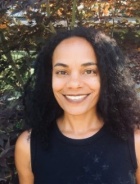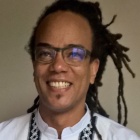RLL announces Black Histories Matter/Black Lives Matter programming
RLL’s Black Histories Matter/Black Lives Matter (BHM/BLM) programming joins in Black History Month celebrations and Black Lives Matter engagement across UB’s campus, the Western New York region, and the United States. As a series, it also attends to how such work weaves with international and transnational commemorations of African and diaspora experience. Each event recognizes the often silenced but always present and intertwining histories – histories in the locally and globally plural – of success and struggle, of disenfranchisement and excellence, all de longue durée. RLL’s BHM/BLM series finds its inspiration in the lives and traces of Black people here (including at varied times in Buffalo and at UB) and around the world: from Harriet Tubman, Abla Pokou, Cécile Fatiman, Toussaint Louverture, and Frederick Douglass, to Mary Talbert, James Baldwin, Abdias do Nascimento, Mariama Bâ, Yolanda Guzmán, Maryse Condé, Ananda Devi, Édouard Glissant, Michel-Rolph Trouillot, and Werewere Liking. Conversations with our guests underscore the physical, emotional, artistic, and intellectual Black labor vital to the world we all live in, work from, and imagine. Every event considers, within the diverse intersections of disciplines and identities, what it does (and does not) mean for Black communities worldwide to be, live, and exist as “human,” at varied cultural, material, linguistic, and embodied points of contact and imagination. Broadly assembled, RLL’s BHM/BLM programming aims to model and nurture the work of listening, discussing, and making change across cultures and societies where Black histories and lives must matter.
February 16 2021

4-5pm EST
Black Ecology in a Creole Context
Bénédicte Boisseron
Professor of Afroamerican & African Studies
University of Michigan
Sponsored by the Melodia E. Jones Chair of French, as part of Black Histories Month programming through the College of Arts and Sciences (part of the "Decolonizing Practices" Series)
Register at https://buffalo.zoom.us/meeting/register/tJUvdO2srzMtHdMdKcBpHtP1XapU2p9Gfous.
Attendees who register in advance will be sent samples of any work our guest presenter has shared.
In ecological terminology, commensalism refers to a class of relationship in which two organisms mutually benefit without affecting each other: there is no contract, no profit, and no need to feel indebted or grateful in a commensal relationship. One takes what is needed with no promise of return. This is often how people in Martinique and Guadeloupe relate to the liminal animal world. One leaves leftover food for the creole (stray) dog behind the house with no expectation of pet companionship in return. In this talk, Bénédicte Boisseron looks at Creole culture through the prism of commensalism, arguing that this ecology applies not only to the animal world but also to humans in a post-colonial context. She argues that, ultimately, commensalism might be the best antidote to the afterlife of slavery.
Bio: Bénédicte Boisseron is Professor of Afroamerican and African Studies at the University of Michigan, Ann Arbor. Her interdisciplinary research brings into conversation the Black Atlantic, Race Theory, African-American, Afro-Caribbean, Francophone, as well as Critical Animal Studies. She is the author of the award-winning Creole Renegades: Rhetoric of Betrayal and Guilt in the Caribbean Diaspora. Her most recent book, Afro-Dog: Blackness and the Animal Question, draws on recent debates about black life and animal rights. She is currently at work on a book tentatively titled, Black Freeganism.
February 23 2021

4-5pm EST
Queer Collaborations: Practicing Co-Performative Witnessing in Haiti
Mario LaMothe
Assistant Professor of Black Studies and Anthropology
University of Illinois-Chicago
Sponsored by the Melodia E. Jones Chair of French, the Humanities Institute Performance Research Workshop, the Department of Romance Languages and Literatures, and the College of Arts and Sciences (part of the "Decolonizing Practices" Series)
Register at https://buffalo.zoom.us/meeting/register/tJEldOuupjguHtPSal6kgVDFrTW_2CAbnWZi.
Attendees who register in advance will be sent samples of any work our guest presenter has shared.
The presentation revolves around Mario LaMothe’s ethnographic collaboration with queer Haitians and queer Haitian performance scholars who journey with their interlocutors through socio-politically charged endeavors. Teasing out the struggle, discomfort, and benefits that emerge from documenting activist responses to the national policing of same-sex desire, LaMothe previews how embodied and artistic testimonials are affective and regenerative only if their makers and chroniclers are not only committed but are also humbly yet dynamically co-present. This method is his self-imposed imperative that extends the temporality of the ethnographic research and which, Dwight Conquergood and D. Soyini Madison term “co-performative witnessing.” LaMothe illuminates how the concept is also applicable to non-researchers such as queer Haitian photographer Josué Azor who pools his resources, knowledge, and abilities with his allies to re-imagine Haitian embodiment and activate of spaces of liberation that stretch themselves and Haitianness beyond social, cultural, and political barriers.
Bio: Mario LaMothe is Assistant Professor in the Departments of Black Studies and Anthropology at the University of Illinois at Chicago, where he is also a faculty affiliate in Gender and Women's Studies, and Museum and Exhibition Studies. His research focuses on embodied pedagogies of Haitian arts and expressive cultures, and the intersections of queer lifeworlds and social justice in the Caribbean. Mario is the co-convener of Afro-Feminist Performance Routes, a biennial focused residency celebrating the dance artistry of African and African diasporic women. His work has appeared in e-mesferica, Conversations Across the Field of Dance Studies, Women and Performance, the Journal of Haitian Studies, The Routledge Companion to African American Theatre and Performance, and Duke University Press’ co-edited volume Time Signatures: Race and Performance after Repetition. He is also a performance artist and LGBTQI rights advocate.
February 24 2021

3-4pm EST
The Epic of Matouba in Aimé Césaire’s "Mémorial de Louis Delgrès"
Malik Noël-Ferdinand
Faculté des Lettres et Sciences Humaines
CRILLASH
Université des Antilles
Sponsored by the Department of Romance Languages and Literatures and the College of Arts and Sciences
Register in advance for this meeting:
https://buffalo.zoom.us/meeting/register/tJMlcuyurzovGN2GYM6E3J4pbsL26YaRjmn9
In December 1958, Aimé Césaire published “Mémorial de Louis Delgrès” for the first time. Standing as one of Césaire’s most prominent works, the poem recalls the story of the Guadeloupeans who fought against Bonaparte’s army in May 1802. The French Consul needed to end the colony’s “semiautonomous regime” (Dubois 319) and wanted to restore slavery that had been abolished in 1794. Led by Louis Delgrès, an experimented Martiniquan officer, the Guadeloupean freedom fighters were defeated. And as an ultimate maneuver, they chose to blow up themselves when the French troops step foot in their last refuge, a redoubt they had built on the upper hill of Morne Matouba. In singing Delgrès’s and his companions’ heroism, Aimé Césaire embraces the ancient traditions of epic poetry: he compares Delgrès to multiple mythological figures, and composes an architecture of phosphorescent melodies and unfathomable images. Accordingly, the poem epitomizes the writer’s desire of creating hallowed Caribbean roots. Indeed, Césaire not only describes the 1802’s epic battles but the poet also focuses on the crucial role of Guadeloupean natural landscape within the war. For it is ultimately through this landscape that Delgrès’s epic memory speaks to the contemporary Antilleans. Noël-Ferdinand’s talk will discuss how the epic form and ecopoetic texture of “Mémorial de Louis Delgrès” unveil Aimé Césaire’s poetical and ethical quests.
February 26 2021
4-5pm EST
Panel Discussion: Black Latinidades: Intersections of Language and Race in Institutional Contexts
Sponsored by the Department of Romance Languages and Literatures and the College of Arts and Sciences
Hosted and organized by: Elizabeth Herring Dudek – Assistant Professor of Spanish, D’Youville College
Register in advance for this meeting:
https://buffalo.zoom.us/meeting/register/tJAkdO-hrjgpHtyAocG8zeWwAW2RvtBwIkcW
After registering, you will receive a confirmation email containing information about joining the meeting.
We will explore Afro-latinidad in the US and the Atlantic World in its historical context, in education, among Heritage Spanish speaking communities, and in its broader institutional and ideological context, with special attention to the city of Buffalo and the Great Lakes region. Panelists include:
Ángela Betancourt-Ciprian – Assistant Instructor and Ph.D. candidate, University of Illinois, Chicago
Gliset Colón – Assistant Professor of Exceptional Education, Buffalo State University, SUNY
Aris Moreno Clemons – Ph.D. candidate at the University of Texas at Austin; Assistant Professor, University of Tennessee, Knoxville
Adrián Rodríguez-Riccelli – Visiting Assistant Professor, University at Buffalo, SUNY
March 9 2021

2-3pm EST
In the Mode of the ‘You,’ or Opacity’s Relation: Anti-Racism and the Culture Industry, James Baldwin, Ta-Nehisi Coates, Raoul Peck, and Igiaba Scego
Alessandra Benedicty-Kokken
Research Coordinator and Senior Researcher
Research Center for Material Culture, Nationaal Museum van Wereldculturen
Sponsored by the Melodia E. Jones Chair of French, the Department of Romance Languages and Literatures, and the College of Arts and Sciences (part of the "Decolonizing Practices" Series)
Register at https://buffalo.zoom.us/meeting/register/tJYrdeCgpj0oGtSLpMrlygd8kBbPBRc-d40G
Attendees who register in advance will be sent samples of any work our guest presenter has shared.
In this talk, Alessandra Benedicty-Kokken considers the relationship between and among recent popular cultural texts and their relationship to anti-racist activism, especially among those who are white (with all the complexities brought to the term). In a 2020 episode of Code Switch (September 16), Gene Demby and Shereen Marisol Meraji mention that an increased participation in Black Lives Matters protests among those who understand themselves and/or are understood as white has taken place perhaps, thanks to well disseminated books and films that have brought attention to BLM among those who used to neglect, ignore, or be unaware of the movement. Dembi and Meraji’s statement beckons the questions: What is at stake when white readers read Black authors? When through readings and screenings do they become more active allies, involved in BLM protests? Who stands to gain from such allyship? In particular, in this talk, Alessandra reflects on the popularity of specific works by four creators and public intellectuals—James Baldwin, Raoul Peck, Ta-Nehisi Coates, and Igiaba Scego—as related to what it means when a Black author deploys the ‘mode of the you.’ How does the use of the second person in their work “mis/interpellate” (in the words of James R. Martel) white audiences? In her deliberations, Alessandra thinks through Glissantian calls for Opacity and Relation, alongside recent academic work of Rich Blint, Christian Flaugh, Kaiama L. Glover, Kwame Nimako, Sandra Ponzanesi, and Michael Rothberg.
Bio: Alessandra Benedicty-Kokken is Research Coordinator and Senior Researcher at the Research Center for Material Culture at the Nationaal Museum van Wereldculturen in the Netherlands. Headed by Wayne Modest, the role of the RCMC is to critically interrogate the historical legacies of ‘the ethnographic museum.’ Alessandra has publications in Studies in 20th and 21st Century Literature, Journal of Haitian Studies and the collection, Raoul Peck: Power, Politics, and the Cinematic Imagination (2015). She is the author of Spirit Possession in French, Haitian, and Vodou Thought: An Intellectual History (2015), and has co-edited “Revisiting Marie Vieux Chauvet,” a special issue of Yale French Studies (2016), and The Haiti Exception: Anthropology and the Predicament of Narrative (2016). Alessandra currently holds an affiliation with Gender Studies at Utrecht University, and was formerly Associate Professor of Caribbean and Postcolonial Studies and French at the City College of New York, and the Graduate Center (City University of New York). She is also Series Editor for Brill’s Caribbean Series, Book Reviews Editor for the Journal of Haitian Studies, and member of the FACE Foundation’s French Voices selection committee.
March 30 2021

4-5pm EST
French but not (Q)White: Race and the Republic
Mame-Fatou Niang
Associate Professor of French and Francophone Studies
Carnegie Mellon University
Sponsored by the Melodia E. Jones Chair of French, the Department of Romance Languages and Literatures, and the College of Arts and Sciences (part of the "Decolonizing Practices" Series)
Register at https://buffalo.zoom.us/meeting/register/tJckcOmvrDssGNA65XFUvLRGEPBqQnw9Y9as
Attendees who register in advance will be sent samples of any work our guest presenter has shared.
Black French studies are at an embryonic stage compared to that of Great Britain and the United States. The field has increasingly attracted interest since the 2000s, and the publication of Pap Ndiaye’s La Condition Noire. As an area of scholarly inquiry, Black French studies focus on the emergence of Black identity politics within the universalist tenets of French republicanism, the rise of Afro-French intellectualism, and constant circulations between mainland France, Africa and the African diaspora. This talk is a series of reflections from the perspective of an Afro-French scholar-artist: What is it to be Black in France? Black and French? How do we talk about race in a country that struggles to see it? How do we navigate a field marred by invisibility, the lack of statistics, and the lack of words anchoring Blackness in the French language? How did the 2020 “racial spring” affect the field?
Bio: Mame-Fatou Niang is an Associate Professor of French and Francophone Studies at Carnegie Mellon University, and the author of Identités Françaises (Brill, 2019). Her recent research examines the development of Afro-French identities. Her work has been featured in edited volumes and academic journals among which Contemporary French Civilization, Présences Francophones, and “Racismes de France” (out 10/12/2020 @ La Découverte). Mame is also a photographer and the co-author of a photo series on Black French Islam. In 2015, she co-directed “Mariannes Noires: Mosaïques Afropéennes”, a film in which seven Afro-French women investigate the pieces of their mosaic identities, and unravel what it means to be Black and French, Black in France. Dr. Niang is currently working on a second manuscript tentatively titled “Mosaica Nigra: Blackness in 21st-century France.”
April 20 2021

4-5pm EST
Senegalese Stagecraft: Decolonizing Theater-Making in Francophone Africa
Brian Valente-Quinn
Assistant Professor of French
University of Colorado Boulder
Sponsored by the Melodia E. Jones Chair of French, the Humanities Institute Performance Research Workshop, the Department of Romance Languages and Literatures, and the College of Arts and Sciences (part of the "Decolonizing Practices" Series)
Register at https://buffalo.zoom.us/meeting/register/tJMkdeyuqD4oG9JdJAtLjtjMmB4JoPebQnXS
Attendees who register in advance will be sent samples of any work our guest presenter has shared.
Western-style theatrical performance was first introduced to the French-speaking countries of sub-Saharan Africa by way of French colonial pedagogy, most notably in the 1930s at the selective École normale William Ponty. This talk will explore the impact of such a colonial stage heritage on an enduring national performance tradition in Senegal. Senegalese stage artists have, since the interwar colonial performances, crafted an array of decolonizing stage spaces that implement alternative Sufi ontologies, adopt new forms of media, and embrace Global South activism in order to reclaim theater as a Senegalese invention.
Bio: Brian Valente-Quinn is an assistant professor of French at the University of Colorado Boulder. His research focuses primarily on Francophone African literature, theater and performance. Valente-Quinn’s work has appeared in Politique Africaine, Research in African Literatures, and Theatre Journal, and his forthcoming book, Senegalese Stagecraft: Decolonizing Theater-Making in Francophone Africa will be published in July 2021 as part of the “Performance Works” series by Northwestern University Press.



